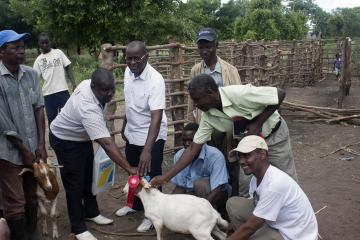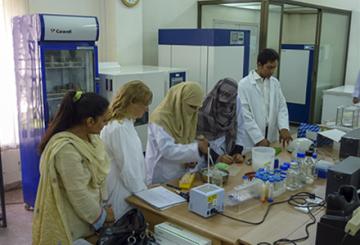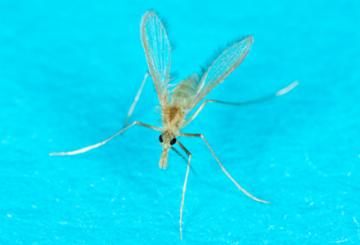Office of International Research Engagement and Cooperation
ARS’s Office of International Research Engagement and Cooperation (OIREC) – formerly known as the Office of International Research Programs – commemorates its 20th anniversary this year.
Originally established in 1999, OIREC was designated as the primary facilitator of ARS’s international operations and relationships.
Since then, OIREC has collaborated with other USDA and federal partners, foreign governments, academia, and international organizations to enhance productivity, effectiveness, and impact of ARS National Programs. Their work has helped facilitate ARS’s ability to achieve major breakthroughs in global problem-solving, providing cutting-edge solutions to pressing multinational issues ranging from food security to biodefense.
In April 2020, OIREC was revamped to better support ARS efforts to address the global challenges of today.
“We changed our name to better reflect our role within the agency,” explained Ingrid Watson, Deputy Director of OIREC.
“To better serve ARS, we established new approaches, like an International Engagement Council to support cross-agency coordination that helps empower ARS researchers to develop new ideas, approaches, and resources beyond U.S. borders,” added Bryan Norrington, Director of OIREC. “With these changes, and our continued partnership with ARS researchers, we’re strengthening our ability to help advance the agency’s mission.”

Members of the goat improvement project visited a collaborative Community Based Breeding Project in Lower Shire, Malawi. Using criteria developed by local breeders, community-elected committees select the best ram goats and award the breeders for their work. (Photo courtesy of African Goat Improvement Network)
Partnerships, Programs, and Projects
Over the years, OIREC has developed important relationships and networks across the globe. From those friendships, new ideas, resources, and expertise flourished beyond national borders to help create innovative approaches to challenges.
Here are some of the major milestones ARS has achieved with a few of our international partners:
Agricultural Research Council of South Africa (ARC)
OIREC coordinates ARS’s partnership with ARC, which has resulted in several collaborative efforts including the Feed the Future goat improvement project, Foot-and-Mouth Disease virus surveillance, and vaccine development projects.
The partnership continues as ARS scientists utilize genetic data from the African Goat Improvement Network to develop new goat breeding techniques that aim to improve animal survival, fertility, and growth in extreme environments.

The Cotton Productivity Enhancement Program (CPEP) encourages young Pakistani scientists through in-country training and Borlaug Fellowships to work with U.S. scientists. (Photo courtesy of ICARDA)
Cotton Productivity Enhancement Program
Initiated in 2011, this program is a comprehensive project involving the International Center for Agricultural Research in the Dry Areas (ICARDA), USDA, and Pakistani partners. The program aimed to mitigate the effects of a devastating disease in cotton called cotton leaf curl virus by proactively developing effect diagnostic tests to track the disease.
This research has resulted in the development and release of virus resistant cotton varieties and improved agronomic practices for both Pakistani farmers and U.S. growers.
LandPKS
Originally designed for Africa in cooperation with the U.S. Agency for International Development, LandPKS is a mobile app that aims to help farmers understand and manage their land in a sustainable and environmentally friendly way using soil-specific information. It is currently being adapted for use by American ranchers and farmers for land-use planning and agricultural decision-making.
U.S.-Israeli Binational Agricultural Research and Development Fund (BARD)
OIREC frequently partners with BARD, a competitive funding program jointly conducted by American and Israeli scientists to help researchers find opportunities to identify significant agricultural problems and perform mutually beneficial research. BARD also supports international workshops and fellowships, for which ARS researchers are encouraged to apply.
To commemorate BARD’s 40 years of activity in 2019, OIREC collaborated with BARD to help disseminate some of the most important agricultural breakthroughs ARS scientists and other BARD affiliates have achieved together.
Virtual Laboratories
OIREC continuously works with agricultural organizations abroad to establish mutually beneficial collaborations between ARS researchers and international scientists. Currently, ARS shares ‘virtual laboratories’ with Brazil’s Embrapa and the South Korean Rural Development Administration (RDA).

A sand fly, Phlebotomus papatasi, can transmit parasites that cause leishmaniasis, a disease that can cause permanent skin damage and severe organ damage. (Stephen Ausmus, D2642-4)
Overseas Biological Control Laboratories (OBCL)
The management of invasive species is a topic that is high on the priority list for ARS and many research organizations, and biological control is one method that is proving successful against many of these agricultural pests.
OIREC helps to coordinate a network of overseas biological control laboratories and partnerships – located in France, Argentina, Australia, and China – that provide access to biological control agent candidates in their native environments to counter these invaders. These collaborators have identified and evaluated biological control options to combat harmful invasive species that negatively impact American ecosystems, including black imported fire ants, brown marmorated stink bugs, Old World climbing fern, and saltcedar weeds.
In 2019, ARS researchers with the European Biological Control Laboratory in Thessaloniki, Greece, developed a new specific method of detecting and quantifying minute amounts of sandfly larvae DNA in soil. By detecting these disease vectors early, it is easier to combat leishmaniasis, a serious parasitic disease transmitted by adult female sandflies that is prevalent in the tropics and southern Europe. Though it is not common to the continental United States, leishmaniasis is viewed as a serious and recurrent health problem by the U.S. Department of Defense.
This development not only has the potential to revolutionize how vectors of disease are surveilled and controlled, but it also spurs the creation of new risk assessment tools and control methods that will preserve wildlife, livestock, and public health around the world.
“Our scientists are world renowned and ARS is truly a global leader in agricultural discoveries,” said Norrington. “OIREC will continue leveraging our extensive international network of experts in science, agriculture, politics, diplomacy, and security to help ARS scientists identify emerging ideas and solutions, increase the impact of research and development spending, and deliver new technologies to the world.”
More information about OIREC, can be found on their page. – by Georgia Jiang, ARS Office of Communications

